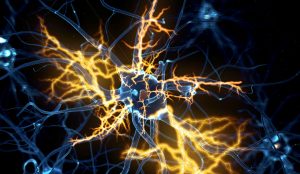Motor Neurone Disease (MND) affects around 5000 people in the UK at any one time and the brutal reality of the illness is that it is overwhelmingly likely to be fatal. The progressive and debilitating disease has no cure and the majority of sufferers will not survive more than a few years with the most common form of the illness, known as ALS. However, a recent discovery by scientists may paint a brighter future for those who develop the illness. A new understanding of a particular protein could hold the key to being able to stop the progression the of MND in its tracks. But what exactly is this discovery?
What Is This Protein?
 The protein that’s been observed is called FUS and it’s a crucial element to ensuring that nerve cells work as they should. It does this by switching between two physical states; oily droplets and a more solid jellied form. Before moving on to what these states are for it’s important to understand other areas of the brain that are related, in particular the role of synapses. A synapse is the point between nerve cells in the brain where electrical signals – or instructions – are sent through. In order to continue working correctly the synapse must produce more and more proteins to pass on instructions. This brings us back to the FUS protein. While in a jelly state, FUS grabs the instructions sent via the synapse for new proteins and then releases them forward as it changes to an oil, thus helping make more proteins. This keeps brain cells active and functioning correctly.
The protein that’s been observed is called FUS and it’s a crucial element to ensuring that nerve cells work as they should. It does this by switching between two physical states; oily droplets and a more solid jellied form. Before moving on to what these states are for it’s important to understand other areas of the brain that are related, in particular the role of synapses. A synapse is the point between nerve cells in the brain where electrical signals – or instructions – are sent through. In order to continue working correctly the synapse must produce more and more proteins to pass on instructions. This brings us back to the FUS protein. While in a jelly state, FUS grabs the instructions sent via the synapse for new proteins and then releases them forward as it changes to an oil, thus helping make more proteins. This keeps brain cells active and functioning correctly.
How Does This Relate to MND?
If an individual has MND then the FUS protein cannot work correctly. It’s been discovered that instead of releasing the captured instructions by changing into an oil the protein becomes locked in the jelly state. This prevents the vital instructions from being sent, subsequently impairing the production of proteins and the function of synapses. The brain cells are then left without the signals they need and die off, which causes the external symptoms of MND. The exact reason for FUS becoming stuck as a jelly is unclear, but it seems to be down to a mutation of the protein preventing enzymes helping it to change state. The goal now is to find a way to use these enzymes to control the process through a form of medication.
 It Will Take Time
It Will Take Time
It’s important to note that although this discovery is ground-breaking it will be some time before it can be used to help those with MND. Not knowing why this happens in the first place is a big reason as this is crucial to getting any future medication right. For example, simply creating a medication that can turn FUS oily would present a host of other issues as it needs to be able to regulate the changing of states, not just force a change. For now, research must continue, but the future does look that little brighter for those who will develop MND.
